Contents
Guide

The author and publisher have provided this e-book to you for your personal use only. You may not make this e-book publicly available in any way. Copyright infringement is against the law. If you believe the copy of this e-book you are reading infringes on the authors copyright, please notify the publisher at: us.macmillanusa.com/piracy. For Anne You lie in our bed as if an orchard were over us. You are whats fallen from those fatal boughs.
Where will we go, when they send us away from here? In order for men to know what might be coming, Drought, or torrential rain, winds bringing the cold, Jove, the father himself, provided signs: The warnings of the moon in its monthly round; What it might mean when the wind suddenly dies; What the farmer sees, and sees again, that tells him To keep his cattle close to the barn and shelter. Just when the wind of an impending storm Begins to blow, perhaps in the inlet channel There are signs of swelling and heaving in the water, Or maybe, far away, in the high mountains, A sudden loud crash is heard, or the murmur of trees In the neighboring wood all of a sudden sounds different. Then too the sea-swells rise against the keels, And the gulls fly landward crying in their flight, And the little sea coots run along the shore, Looking as if theyre frolicking as they go, And the heron deserts its own familiar marsh To get up as high as it can, over the clouds. And the passage continues, telling you about how, when the storm is coming on, [y]oull see a star precipitously falling, / Trailing its shining wake along the blackness, and bits of straw and leaves toss on the wind / And feathers float and play upon the waters, and you can see the cranes depart / For the deep inland valleys, and crying swallows will fly [a]round and around the pools in their excitement, and the heifer looks up at the sky and sniffs the change in the air, and even indoors, at night, / The young girl at her spinning sees the signs / Of what it is thats going to happen soon: / The oil in the lighted lamp sputters and sparks; / Theres a buildup of putrid fungus on the wick. The cadence begins with human beings for whom Jupiter has provided signs, and it ends with the young woman reading the signs of the coming storm in the buildup of putrid fungus on the candlewick. But she herself is a sign of whats coming, and so are the sea coots running along the shore, and the crashing sound in the mountains, and the sudden swelling of seas, and all the other creatures and phenomena of the world.
They are all creatures together, all readers of signs, and signs themselves, and all of them are going to suffer the storms coming on. It is a nature in which wine no longer flows in the streams, for when Jupiter overthrew his father Saturn the whole world changed: It was Jupiter who put the deadly poison Into the fangs of serpents; commanded the wolf To seek and find its prey; ordained that the storm Should cause the sea to rise and flood the land; Stripped from the leaves of oaks the dewlike honey That made them glisten there; hid fire from man; Turned off the flow of wine that everywhere Ran in the streams In Virgils great myth of the fall of man, it is not through mans own fault, as in the Judeo-Christian myth, but simply because this is how things are, and are going to be, for all creatures, the hills and seas, the fields, the grain, the vines, the beasts and birds, the bees, and the creature man himself. Everywhere in the four books of the poem there are ecstatic and tender celebrations of the very life in things: The trees that rise up of their own free will / Into the light, wild, happy in the strength / They got from natures power in the earth; the cucumber tendril that winds and turns and coils / Its way through the grass; the promising colt whos a higher stepper than all the other / Foals there are in the fields, and puts his feet / More lightly down again on the soft turf; the murmuring humming of the bees as [t]hey groom themselves and hither and thither flit / Around the doors and thresholds of their houses; and the ravens whose hoarse voice you can hear, repeated maybe / Three or four times over, or, high in the trees, talking together, / In some uncanny way expressing delight / At being home and safe in their sweet nests / Along with their young. And this joy in the very life of things is always, one way or another, coupled with a darker sense. It is a fallen world and all creatures are vulnerable. The beautiful high-stepping horse grows old and sick: [T]he horse that was once / Victorious now miserably sinks / Over and over again pounding the earth / With a disconsolate hoof The bees fall ill and you can see [t]he sick ones not yet dead that hang almost / Motionless around the doors outside, / With crossed and tangled feet The vulnerability of these creatures and what they do, and what happens to them, is essential to the beauty and value the poem sees in them.
Pity is the context for the poems celebrations; admiration is the context for the poems commiserations. It is remarkable how in this great work the triumphs and sufferings of the creatures other than man are fully meaningful and substantiated in themselves; theyre never merely background for, nor merely metaphors for, the story of men. The dignity of what they are is never exploited as pathetic fallacy; there is no condescension in the poem toward those others who share our fallen world with us. The respect and admiration Virgil has for the little goats, who are able / To forage in woods and on the Lycaean heights, / Feeding on brambles and mountain-loving briar, and who know how to come home all by themselves / With their kids following after, the she-goats udders / So full that they can scarcely clear the threshold, is not unlike the respect and admiration he has for the old Corycian man, triumphantly gathering for supper what hed managed to grow [o]n a little patch of land that nobody wanted, / Too poor for oxen to plow, unfit for pasture, / Not right for planting vines. But if the Georgics is a poem about all vulnerable creatures, it is also of course a poem by a human being with his own vital human interests, and the whole truth and intention of the poem is not only what all the creatures of Jupiters fallen world share together, but the special meaning of this situation for man. Jupiter [s]tripped from the leaves of oaks the dewlike honey / That made them glisten there; hid fire from man; / Turned off the flow of wine that everywhere / Ran in the streams; all this so want should be / The cause of human ingenuity, / And ingenuity the cause of arts.
Jupiter ordained that the way should not be easy. He first established the art of cultivation, / Sharpening with their cares the skills of men, / Forbidding the world he rules to slumber in ease. So human culture began. Little by little, men learned to plow, learned to make fire and traps for hunting, lines and nets for fishing; they learned to count the stars and give them names. Then followed other arts; and everything / Was toil, relentless toil, urged on by need, the need for it never exhausted: three times a year, / Four times, you must turn the soil, to open it up / The farmers labor circles back on him / As the seasons of the year roll back around / To where they were and walk in their own footsteps. The poem is one of the great songs, maybe the greatest we have, of human accomplishment in the difficult circumstances of the way things are.
You can hear in the poem the pleasure it takes, how proud it feels about what men know, learning how to bring about their precarious successes. Theres the man who induces water to flow down from a brook / Through channels toward his planting, and when theres drought / And the field is parched and scorched and the little plants / Look like they may be dying, behold, theres water. Theres a farmer I know of [who] sits up till all hours / In front of the fire in winter intently using / His knife to fashion torches out of branches. / Meanwhile his wife is doing winter chores, / Singing a song to solace her as she works. Theres joy in Virgils description of the minutiae of tasks well done, testing the soil, for example, by taking a wicker basket down from the roof-tree where it was hanging: [P]our in / Fresh water from the spring; youll see the water / Make its way through, and the big drops fall into / The receptacle below; then taste the water; / The taste will tell the story. Or teaching your bullocks to begin to get used to the yoke: And after a little while, their free necks having / Become accustomed to their servitude, / Tie the young bullocks together two by two, / Collar tethered to collar, and make them learn / To walk together, step by step, a pair.


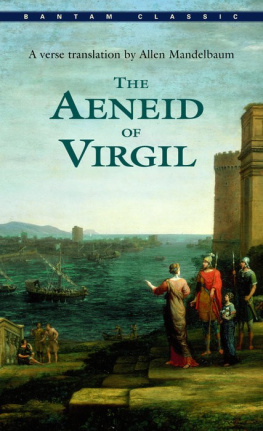
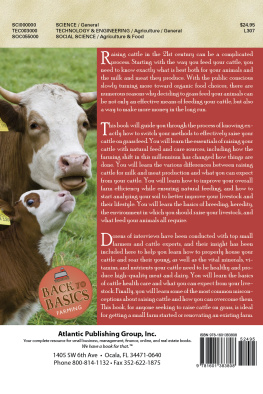
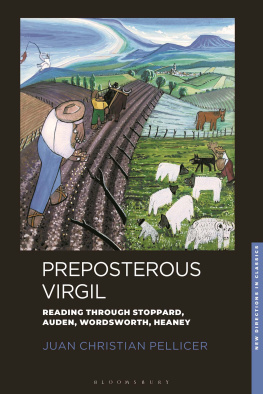
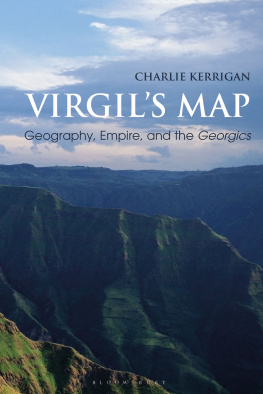
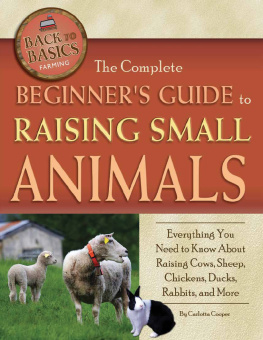
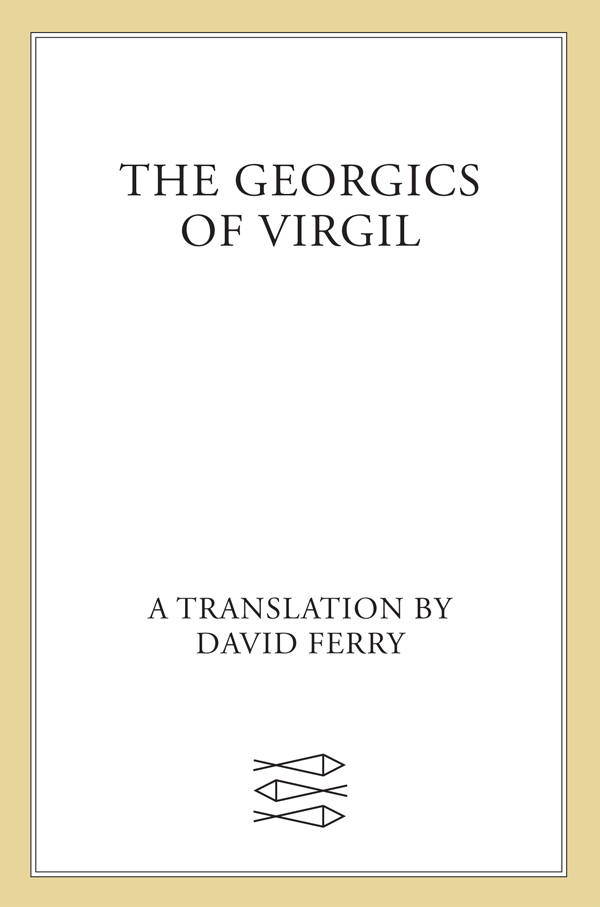
 The author and publisher have provided this e-book to you for your personal use only. You may not make this e-book publicly available in any way. Copyright infringement is against the law. If you believe the copy of this e-book you are reading infringes on the authors copyright, please notify the publisher at: us.macmillanusa.com/piracy. For Anne You lie in our bed as if an orchard were over us. You are whats fallen from those fatal boughs.
The author and publisher have provided this e-book to you for your personal use only. You may not make this e-book publicly available in any way. Copyright infringement is against the law. If you believe the copy of this e-book you are reading infringes on the authors copyright, please notify the publisher at: us.macmillanusa.com/piracy. For Anne You lie in our bed as if an orchard were over us. You are whats fallen from those fatal boughs.